MEES Colloquium 2018
Bill Dennison · 1 commentsThe Marine Environmental and Estuarine Science (MEES) program is a multi-campus graduate education program within the University System of Maryland. Each autumn, a MEES Colloquium is hosted by one of the campuses that sponsor MEES. The 2018 MEES Colloquium was sponsored by the Appalachian Laboratory in Frostburg, Maryland on 5-6 October.
As part of the 2018 MEES Colloquium, a panel of environmental scientists was invited by graduate students to talk about their experiences following graduate school. The panel members were selected to represent a diverse array of career options. Astrid Caldas, a Senior Climate Scientist with the Union of Concerned Scientists, has a diverse background including many years in academia at the University of Maryland College Park. Astrid represented a non-governmental organization (NGO) career path. Lonnie Consalves, National Oceanographic and Atmospheric Organization (NOAA) Research Ecologist, is a graduate of the MEES program through the Living Marine Resources Cooperative Science Center based at the University of Maryland Eastern Shore. Lonnie represented a federal agency career path. Rebecca Fox, an Assistant Professor at Washington College, is a MEES graduate from Horn Point Laboratory where she worked with Tom Fisher. Rebecca represented an academic career path. Steve Doctor, a Natural Resources Biologist with the Maryland Department of Natural Resources, is a MEES graduate from Appalachian Laboratory where he worked with Ray Morgan. Steve represented a state agency career path.
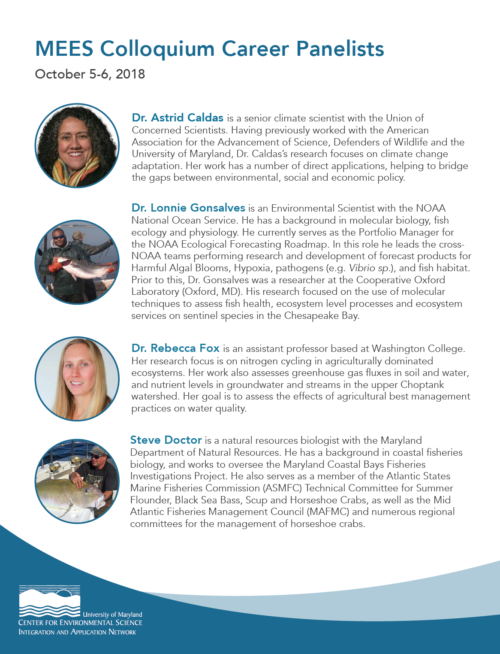
I served as the moderator for the panel, which provided insightful and interesting advice to the current MEES graduate students. We had students submit questions beforehand, and they asked the panel questions such as: “What motivated you to attend graduate school?” and “What skills did you learn in graduate school that helped you get the job you have now?” There were some funny answers, like “drinking.” That led to a discussion of the importance of informal networking. A repeating theme throughout the discussion was “perseverance” in searching for the right job.
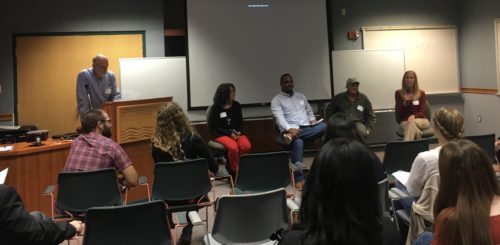
I also facilitated a session that followed the panel discussion, titled “How MEES Can Better Prepare Graduate Students”. I led off with a video of the song “Earthward Bound” that we sent to Ricky Arnold, the MEES alumnus who just completed a 197-day stay in the International Space Station as a NASA astronaut. Ricky was the guest speaker at the 2016 MEES Colloquium, sponsored by the Integration and Application Network in Annapolis. Melanie Jackson, a current MEES student, sang this song after it was adapted from Simon and Garfunkel’s “Homeward Bound”. Ricky safely landed in a Soyuz capsule on the Kazakhstan steppe on 4 Oct, the day before the MEES Colloquium. I also provided a brief summary of the recent National Academy of Sciences report, “Graduate STEM Education for the 21st Century”. It was interesting that many of the things that the panel members had previously discussed were included in this excellent report. With that background and the panel’s recommendations in mind, students and faculty delivered a rapid fire brainstorming of things that not only the MEES program could do to improve the educational program, but that the students and faculty could do as well.
My personal highlight of the 2018 MEES Colloquium was the 3-minute presentation session by the graduate students. Miranda Marvel, Vanessa Vargas-Nguyen, Andy Gougherty, Srishti Vishwakarma, Caroline Wiernicki, Katie Landowicz, Pinky Liau, Hannah Morrissette, and Alec Armstrong used great visuals and were able to succinctly describe their diverse research. The 1-minute talks delivered without slides were also impressive, but I missed having the visuals. The poster session was also a great way to meet the students and hear their enthusiasm for their respective research projects.
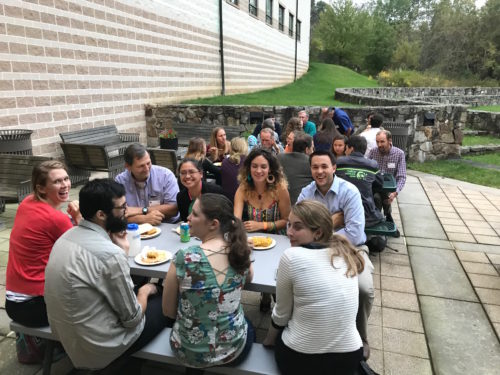
On Saturday, the Appalachian Laboratory staff organized three excellent field trips, aided by excellent weather. We could choose from three options. The field trip options included: 1) the ecology of Finzel Swamp, 2) the legacy of coal mining in Georges Creek watershed, and 3) Fourmile Ridge Wind Farm on Savage Mountain. I chose the wind farm visit since I had never experienced a wind turbine up close and had no idea of how they worked. Dave Nelson from Appalachian Laboratory took us to the wind farm and, after calling the control room to have it temporarily shut down, an Exelon engineer showed us the inside of a wind turbine tower. We learned many tidbits about wind power generation, including: a) one hour of a single wind turbine operation produces enough electricity to power a household for one year, b) the tips of the blades travel in excess of 250 miles per hour at full speed, and c) because the limiting factor for blade size is transporting them via highways and roads, offshore wind turbines can be larger since they do not have this limitation.
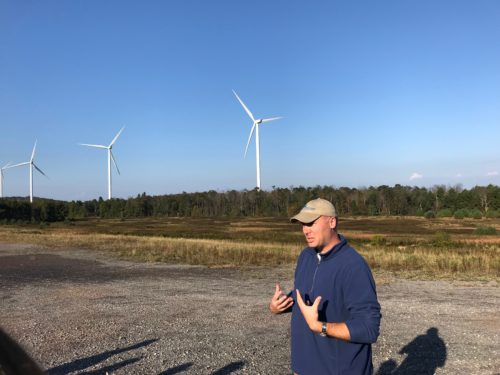
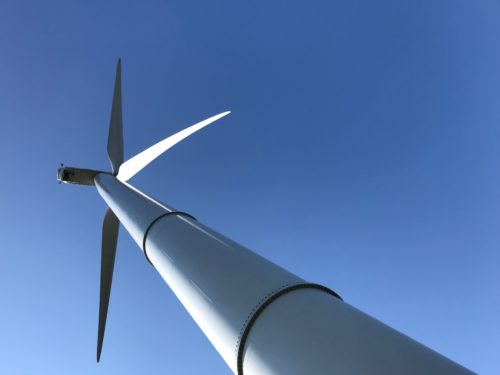
The Appalachian Laboratory staff accommodated the large gathering, which pushed the limits of the facility, fed us very well, provided us with seamless logistical support, and were able to maintain a friendly demeanor throughout the event. They were the real stars of a stimulating MEES Colloquium.

About the author
Bill Dennison

Dr. Bill Dennison is a Professor of Marine Science and Vice President for Science Application at the University of Maryland Center for Environmental Science.
Next Post > 2018 IAN Retreat at the Chesapeake Bay Environmental Center
Comments
-
Dylan 7 years ago
Ogre is looking relatively normal in that pic, Bill! Nice recap